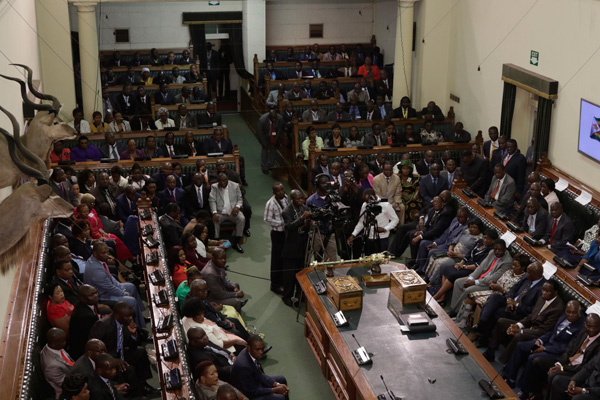Zimbabweans have to do away with the two-thirds majority in Parliament and vote for multiple political parties in order to stop politicians from abusing their authority, Professor Welshman Ncube has said.
Prof Ncube argued that a supermajority in Parliament has made it easier for the Zanu-PF led government to amend the country’s constitution ‘unnecessarily.’
He said without a two-thirds majority, it would take time for one political party to amend the constitution as it would require the by-in of other groupings and ultimately their constituents whom they represented.
Speaking at a public opinion space meeting on the proposed Constitution Amendment (No.2) Bill held Wednesday in Bulawayo, Prof Ncube, a constitutional expert underscored that without a two-thirds majority, political parties would trade as equals and not impose their interests on others.
“The provisions to change the constitution normally requires what we call supermajority, in our case in Zimbabwe, we need two-thirds majority, as it’s assumed it is difficult for anyone to garner two- thirds majority. But in Zimbabwe we know our elections and that Zanu PF has had two-thirds majority successively,” he said.
Prof Ncube, who is also the vice president of the MDC, remarked that part of the problem emanated from the electorate.
“That is a part of the problem because we-the-people must always be slow to give any political party that much power but we gave them, now they are changing the constitution without any consultative consensus process. The amendments went through Zanu PF processes, go to Cabinet then afterwards a bill emerges, which we see for the first time when it has been published. That is problematic,” he quipped.
The most important thing to make sure of was that no one has a two-thirds majority, Prof Ncube reiterated.
“No single political formation must have a two-thirds majority to be able to unilaterally on their own, effect change. If you don’t have a two-thirds majority an amendment is not necessary, it means you have to reach out to others, persuade them and everybody will be ultimately answerable to the electorate. Before these players agree to what they are proposing they will look back and say ‘will our constituency accept this’ because we all have to face the electorate at end of day,” he explained.
Prof Ncube said doing away with the two-thirds majority was the ‘surest’ point of minimising unnecessary amendments, which consolidated and accumulated power for those in power.
“They believe ‘the moment I have two thirds, I will do what I can because the people voted for me therefore, I can do it’,” the constitutional lawyer posited.
“When you know there is a political price to pay for doing something, even if you have a two-thirds majority, you will think twice before doing something. But if there is no political price to pay you will do it anyway, which is why citizens must resist so that we don’t have these willy-nilly amendments.”
A legal practitioner, Lactricia Mumba, asserted that when it came to elections, voters must know there were consequences to their vote.
“The problem we have now is deeper than discussions, it starts from how we vote. When we conduct voter education, we start six months before elections and we teach people how to mark their ‘x’ inside the box so it’s not a spoilt ballot. But we forget that ‘x’ is just a formality on paper,” she said.
“Voter education should go to the root to what your vote means, even those in rural areas should know what their vote means. To vote means the person I am voting for, I am sending them with my views, not to bring me rice or seed, but to enact laws in parliament.”
Mumba emphasised that two-thirds majority went to the root of voter education, noting if people knew voting represented something bigger, they would be empowered.
“When I vote for someone to represent my views, I don’t need to beg for seed but I would be empowered to buy my own seed. The problem of two-thirds majority is not at the top but at the bottom, from voter education. We must not cry after these amendments have been made but we must empower people to know what their votes means,” the lawyer opinioned.

